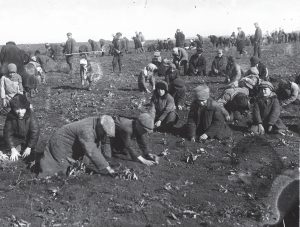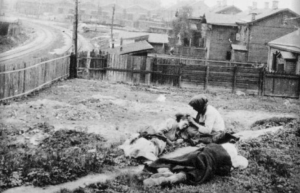Ninety years ago millions of Ukrainians died horrible deaths as a result of the destruction of the family farm system as ordered by Joseph Stalin.
I became aware of the Holodomor, which means death by starvation, as a daily newspaper reporter covering a memorial event at the Ukrainian Centre in London, Ontario, years ago. Some of the event participants were survivors of a nation-wide famine caused by the forced conversion of family farms into collective state enterprises by Soviet decree.

They never forgot watching their hardy parents, grandparents, sisters and brothers and neighbours shrivelling into bony feeble figures who perished in a matter of months from scarcity of food. They never forgot eating birds, digging for potatoes in the frozen ground or foraging for berries, leeks and mushrooms in the woods to survive another day.
This Saturday, the fourth in November, Ukrainians around the world will once again remember the man-made famine known as Holodomor that killed an estimated four million people in the Republic of Ukraine from 1932 to 1933.
Recognized today as an act of genocide by Ukrainian law, the great famine has been condemned as a crime against humanity by the European Parliament and most member states of the United Nations, including the United States and Canada.
People in Belarus, Kazakhstan, Moldova and rural Russia were also sacrificed to the aggressive Soviet agricultural policy, but Ukraine suffered the most.
The famine originated in the decision by Soviet leader Joseph Stalin to industrialise agriculture by forcibly creating large state farms. Communist Party enforcers pushed peasants to relinquish their land, personal property and sometimes housing to the state enterprises.
During the early 1920s, eight-six per cent (86%) of Ukrainians lived in rural areas, mostly on small farms. By the late 1920s, the Soviet Union was resolutely pursuing collectivisation and Ukrainians were resisting with more than 6,500 protests recorded in 1930, involving hundreds of thousands of farmers. The peasant revolt resulted in a brutal Soviet crackdown, involving mass arrests, confiscation of property and forced collectivisation.
It became illegal to store crops or keep livestock that was not on collective farms. Soviet propaganda made previously prosperous independent farmers enemies of the state. They were publicly denounced as selfish “kulaks” only concerned with personal gain, a social class that had to be eradicated for the good of Soviet society.

The Soviets stripped Ukraine of its crops and livestock, transporting them to Russia for distribution. An estimated four million Ukrainians died of starvation during a two-year period of deprivation during which they were not allowed to leave Ukraine.
Unlike famines caused by blight or drought, the Holodomor was triggered by a dictator. It was genocide against a people who challenged his totalitarian rule.
I’m writing about this not only to mark Holodomor Memorial Day (Nov. 25 this year) but also to spotlight that Ukraine has been involved in an existential battle with Russia for a long time. The invasion of Ukraine in February 2022 ordered by Russian despot Vladimir Putin is a continuation of that struggle.
Once again, we’ve seen a Russian dictator unleash his wrath against Ukraine for not submitting to his authority, this time attempted subjugation by military coup. Once again, we’re seeing genocide by decree and force.
From the beginning of the invasion, Russians have been stealing grain and other agriculture products from storage in Ukraine. They’ve reduced Ukraine’s capacity to grow and export grain, sunflowers and other crops and have tried to block Ukrainian exports to hungry nations that depend on them.
For the past 21 months, Russia has methodically attacked Ukrainian civic, cultural and social institutions and public utilities. Tabulation of the toll includes about 3,790 schools and 1,270 cultural institutions destroyed or damaged, including libraries, museums, art galleries, theatres and concert halls. Some 218 hospitals, 116 religious institutions and countless residential buildings have been bombed. Last winter, water, heat and hydroelectricity facilities in major cities were repeatedly struck with missiles and drones to make Ukrainians freeze in the dark.
Russia has rained thousands of missiles, bombs and artillery shells on cities like Mariupol, Bakhmut, Sievierodonetsk and Lysychansk, levelling them into ruins. Atrocities include 11,000 children kidnapped and relocated and 90,000 people reporting rapes and sexual assaults by Russian soldiers.
All of this has been done to terrify and demoralize Ukrainians, destabilize their country and erase the country’s identity and ability to cope.
Yet, after enduring all of this, 84 per cent of Ukrainians say they are ready for a long war and 89 per cent of them are not willing to trade any of their occupied territory for a peace deal with Russia.
Putin has publicly declared that Ukraine is not a real country and that Ukrainian is not a real language.
He’s wrong. So wrong. It takes a true nation of united people to endure the battering Russia has dished out and still be able to function and carry on. Ukraine is a real country, for sure.
With their blood, sweat and tears, Ukrainians have shown they value their freedom, independence, identity and 30-year-old democracy too much to capitulate to a fascist dictator with grandiose imperial dreams.
After the dissolution of the Soviet Union in 1991, more than 92 per cent of Ukrainians voted for independence in a national referendum.
Russia has been trying to undermine Ukraine since Putin came to power in 1999, driven by his ambition to recreate the Soviet Union and Russian Empire.
The invasion of Crimea in 2014 and Ukraine in 2022 brought his plans into plain view.
Zbigniew Brzezinski, security advisor to U.S. presidents Lyndon Johnson and Jimmy Carter, once said: “Without Ukraine, there is no Russian empire.”
Putin knows this. That’s why he’s hell bent to degrade and conquer Ukraine. Until he’s done so, his greater ambitions are thwarted.
Ukrainians have shown they’re willing to fight and die for what they hold dear. Their spirit has inspired Americans, Canadians and Europeans to support them with billions of dollars worth of military and humanitarian aid for months.
But as voices on the right grow louder in Western democracies, there are signs the support is in jeopardy. Just this week, the Conservative Party of Canada voted against a free trade agreement with Ukraine. All other parties in Parliament supported it, but the Conservatives are gaining traction for the next election. Also this week, a far-right party topped the polls in the Netherlands, falling short of a majority. The Trumpist MAGA wing of the Republican Party is currently blocking a bill for more U.S. military aid to Ukraine. Hungary and Slovokia, members of the European Union, are bucking EU support of Ukraine. And Poland’s border with Ukraine has just been shut down to trucking by pro-Russian protesters.
Months ago, Putin predicted Western support would wane as the alliance tired of the war and lost their resolve.
“In the end, we”ll grind them down,” he said of Ukraine losing the ability to defend itself.
He’s confident Russian aggression will outlast support for Ukraine.
It would be tragic if Putin turns out to be right because Ukraine would be forced to make an unwanted, untimely deal with the devil, possibly with grim consequences.
Ukraine needs all the help it can get from its allies to achieve the best outcome to the unprovoked and unwarranted invasion of its country. Let’s hope Western democracies can continue to muster the will and resources needed for Ukraine to prevail as a citadel for freedom and democracy.
So hard to read Joe. Yet so important for a full understanding of Putin’s madness, the generations of Ukrainian suffering, as well as the inhumanity of communistic idealism driven by despots. Thanks for sharing this. You are a true follower of the teachings of Jesus, and living out your faith in the presence of the crosses of our day and age. As the ‘Good Friday ‘ hymn asks, ‘Were you there?’. You help us to not turn away.
Publicize your best sources, Joe, please. Al Jazeera English, the Guardian, who else?
Thanks for the response, Bette. My best sources have been Ukrainians I’ve talked to over the years. They’re the folks who’ve touched me with their personal family stories. As for the “facts” of the Holodomor, there are many sources I’ve read or skimmed through, such as the Holodomor Research & Education Consortium, the Holodomor Resource Library, the United Nations Human Rights Office, European Parliament reports, the Canadian Museum for Human Rights, memorialholodomor.org.ua, Anne Applebaum’s book Red Famine and more. News sources I read regularly include The Moscow Times, The New Voice of Ukraine, Kyiv Post, Kyiv Independent, Daily Kos, Ground News, Ukrinform, Ukraine Pravda, Novaya Gazeta and Meduza.I also read reports from the Institute for the Study of War, the Centre for Strategic Studies, Oryx and Euromaidan Press. Bloggers I follow include Denys Davydov, Vlad Vexler, Anna Danylchuk (Anna from Ukraine), Jack Broe, Artur Rehi, Prof. Darren Gerdes and Operator Starksy. According to my spouse, I’m obsessed with the Russo-Ukrainian war. A commentary or opinion piece isn’t like a non-fiction book which requires a bibliography or an academic essay which needs footnotes. It’s a writer’s summary of information gleaned from multiple sources, presented with a point of view. It’s a sifting and blending process, which requires making credibility judgments and, yes, quoting sources transparently without becoming academic and bogging things down.
Thank you for this important and disturbing read, Joe. It is appalling that the Ukrainian people have had to endure so much over such an extended period of time and it is deeply concerning that support for them in this latest tragic war seems to be waning on the international stage. Voices like yours are crucial to ensuring vital support continues and that the maniacal despot that is Vladimir Putin fails in his quest.